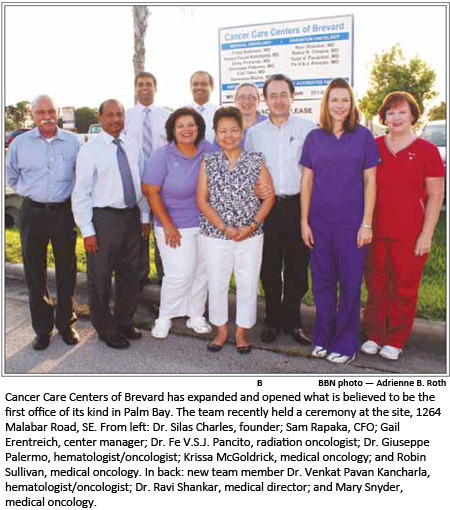
Vol. 30 No. 35 August 27, 2012 A Weekly Space Coast Business Magazine printed in Brevard County, Florida since 1984
By Ken Datzman

Cancer Care Centers of Brevard is growing its network of offices in the region and has opened a new location to serve residents of the largest city in the county — Palm Bay, where more than 100,000 people live.
The Melbourne–based practice’s new office is at 1264 Malabar Road, SE. It’s a consultation office designed primarily for medical–oncology patients and features a 10–station infusion center.
Cancer Care Centers of Brevard said it saw a need in the Palm Bay market for the types of services it provides and established what is believed to be the first office of its kind there.
“There is not a dedicated oncology center in Palm Bay,” said Dr. Venkat Pavan Kancharla, of the Cancer Care Centers of Brevard, who specializes in medical hematology/oncology and has his office at the new location.
“Most of our patients have been going to Melbourne or to Sebastian for their care. So this is an opportunity for us to cater to the needs of the Palm Bay residents.”
The office is near Health First’s Palm Bay Hospital. Because of its proximity, Dr. Kancharla said he will be “conveniently available” to provide services for patients being admitted to Palm Bay Hospital.
A medical oncologist is a doctor who coordinates and oversees the patient’s cancer care. These physicians specialize in the use of medications, such as chemotherapy, hormones, and analgesics (medications to reduce pain), in the management of cancer.
In general, they care for the patient from the moment of diagnosis throughout the course of the disease and survivorship.
Medical oncologists and hematologists such as Dr. Kancharla, who is board–certified in internal medicine, are in demand as the baby–boomer population in the U.S. ages (the 76 million people born BBN photo — Adrienne B. Roth
between 1946 and 1964). Cancer Care Centers of Brevard has expanded and opened what is believed to be the first office of its kind in Palm Bay. The team recently
According to the Centers for Disease Control and held a ceremony at the site, 1264 Malabar Road, SE. From left: Dr. Silas Charles, founder; Sam Rapaka, CFO; Gail Erentreich, center Prevention, the overall incidence of cancer will increase manager; Dr. Fe V.S.J. Pancito, radiation oncologist; Dr. Giuseppe Palermo, hematologist/oncologist; Krissa McGoldrick, medical over the next 15 years, driving the need for medical oncology; and Robin Sullivan, medical oncology. In back: new team member Dr. Venkat Pavan Kancharla, hematologist/oncologist; Dr. oncologists. Ravi Shankar, medical director; and Mary Snyder, medical oncology.
But many communities across the nation will have to scramble in the years ahead to bring on these specialists to meet the growing number of cancer patients.
A new study commissioned by the American Society of Clinical Oncology projects a significant shortage of medical and gynecological oncologists in the U.S. by 2020. Visits to oncologists are expected to increase by 48 percent by that year.
The study found that an aging and growing population, an increasing numbers of cancer survivors, and a slower growth in the supply of oncologists will result in a shortage of 2,550 to 4,000 oncologists by 2020.
The study draws upon the National Cancer Institute’s analysis of Medicare data, and the Center for Workforce Studies at the Association of American Medical Colleges.
In preparation to meet the anticipated demand in the local market, Cancer Care Centers of Brevard, with a network of offices from Titusville to Sebastian, has just recruited Dr. Kancharla to join its team of radiation oncologists and medical oncologists. They play a critical role in the chain of care.
“We are basically the ‘bridge.’ As community oncologists, we do the initial workup. We provide the first or second line of therapy. If we exhaust all of our resources, we then refer to a tertiary center (a major hospital) where there might be clinical trials being conducted,” said Dr. Kancharla.
He added, “But the initial treatment is the same, whether it’s being performed at Cancer Care Centers of Brevard or the (Memorial) Sloan–Kettering Cancer Center or the MD Anderson Cancer Center. It’s the later stages when these big centers may come into the picture if the patient cannot be fully treated on the local level.”
Before he moved here to join the physician team of Cancer Care Centers of Brevard, Dr. Kancharla served as a hospitalist at Vassar Brothers Medical Center in Poughkeepsie, N.Y., and The Reading Hospital Medical Center in Pennsylvania.
A hospitalist is a physician who specializes in the practice of hospital medicine, taking care of the patient during their stay. They work closely with the patient’s primary–care physician.
Following medical school, hospitalists typically undergo residency training in general internal medicine, general pediatrics, or family practice, but may also receive training in other medical disciplines.
Dr. Kancharla worked in the fields of internal medicine, pediatrics, and orthopedics, and provided ear, nose, and throat care at Kingston Public Hospital in Jamaica.
He earned his medical degree and completed an internship at the NDMVP Samaj Medical College in India.
Dr. Kancharla was a resident medical officer at Susrutha Hospital in Hyderabad, India, a 400–year–old cosmopolitan city with a population of 1 million people. Microsoft and Goggle as well as other big–brand technology companies have offices there.
In 2003, Dr. Kancharla came to the U.S. and worked as a medical research assistant at the Hope Center for Blood Diseases and Cancer Care in Terra Haute, Ind. “That’s when I really got interested in cancer. I wanted to become a cancer doctor.”
He completed a hematology/oncology fellowship at Brookdale Hospital Medical Center in Brooklyn, N.Y., before coming aboard Cancer Care Centers of Brevard and opening the Palm Bay office.
“I really like the area. I know some people here. And it’s great to be part of an organization that is committed to the community,” said Dr. Kancharla, who was hired by Dr. Ravi Shankar, the medical director and president of Cancer Care Centers of Brevard.
Dr. Kancharla is practicing in an era of what is fast becoming personalized cancer medicine. Patients are benefiting from a growing understanding of cancer’s genetic weak spots. Research and development of new technologies that pinpoint the novel genetic characteristics of each patient’s cancer are driving the revolution of the concept of personalized medicine.
“It looks like cancer in each person varies, depending upon the kind of cell mutation,” said Dr. Kancharla.
“There are certain mutations in each cancer that are different from person to person. That is what we try to identify — what we initially test for prior to starting the patient’s therapy. And researchers are giving us the tools to do that. We have seen some breakthroughs in lung, colon, and breast cancers.”
Cancer science is undergoing a period of change. Thanks to a rapidly growing understanding of the biology of cancer, treatments can be targeted to the molecular “on– off” switches that drive uncontrolled growth of cancer cells, physicians says.
Significant advances have been made in cancer prevention and screening, hard–to–treat cancers, and reducing cancer occurrence.
The 2011 “Clinical Cancer Advances,” a report published by the American Society of Clinical Oncology, features a total of 54 key developments in the field over the past year. Twelve of the studies are noted as “major” advances, meaning they have the greatest potential impact in patients’ lives.
Separately, cancer–imaging experts at Johns Hopkins University have developed a method for finding and killing malignant cells while sparring healthy ones.
The method, call “theranostic imaging,” targets and tracks potent drug therapies directly and only to cancer cells. It relies on binding an originally inactive form of drug chemotherapy, with an enzyme, to specific proteins on tumor–cell surfaces and detecting the drug’s absorption into the tumor.
The binding of the highly specific drug–protein complex, or “nanoplex,” to the cell surface allows it to get inside the cancerous cell, where the enzyme slowly activates the tumor–killing drug.
Their research, published online in the Aug. 6 journal “American Chemical Society Nano,” is believed to be the first to show that chemotherapies can be precisely controlled at the molecular level to maximize their effectiveness against tumors, while also minimizing their side effects.
Most cancer therapy today is a combination of chemotherapy and targeted drugs, which act “like ‘smart bombs.’ They target specific tumor cells,” said Dr. Kancharla, who has published and presented a number of oncology journal articles and abstracts, and has several studies in progress.
Cancer Care Centers of Brevard offers the Cyberknife Robotic Radiosurgery System as a noninvasive option for patients who are looking for an alternative to surgery and for patients who have inoperable or surgically complex tumors.
With all the cancer research that is ongoing in the field, Dr. Kancharla says “chemotherapy might be phased out altogether in the future and all medications might be targeted therapy. That is the direction personalized care is going. It’s not going to happen overnight. But as researchers find more and more cancer–cell targets, it helps patients in the long term.”
In the largest study of its kind, researchers at Massachusetts General Hospital profiled genetic changes in cancer with drug sensitivity in order to develop a personalized approach to cancer treatments. The study was published in the March 29, 2012, issue of “Nature.”
The research team uncovered “hundreds” of associations in cancer genes and sensitivity to anticancer drugs. One of the key responses the team found was that cells from a childhood bone cancer, Ewing’s sarcoma, respond to a drug that is currently used in the treatment of breast and ovarian cancers. The lower toxicity of the treatment may mean it is a safer alternative therapy for children and young adults with this progressive cancer.
At the recent 48th annual meeting of the American Society of Clinical Oncology, a number of key study findings were presented, highlighting the promise of individualized, “precision” cancer medicine.
The research developments presented in Chicago included:
l Findings from a Phase III trial show that the targeted drug Afatinib delays progression of advanced lung cancers, particularly those with specific genetic mutations.
l The first of a new class of targeted agents for advanced melanoma, a skin cancer, shows promise. A Phase III study finds that the investigational targeted drug Trametinib extended overall survival for certain patients with advanced melanoma, compared with standard chemotherapy.
“Twenty years ago,” said Dr. Kancharla, “physicians didn’t have any medications at their disposal to treat melanoma. “In the last couple of years two (Yervoy and Zelboraf) have been approved by the U.S. Food and Drug Administration. It’s because of the cancer research that is going on today.”
More than 70 percent of skin–cancer deaths are from melanoma, according to the American Melanoma Foundation. If detected in the early stages, melanoma can usually be treated successfully.
l Finally, and what may be important for the local market, a multicenter study performed in Germany finds that it is feasible to routinely conduct “high–quality” molecular analysis of non–small cell lung cancers in community hospitals.
This suggests that such molecular testing can be done routinely outside of academic medical centers, helping to guide the use of effective molecularly targeted treatment for more patients.
Forty years ago, the National Cancer Act, which led to major U.S. investments in cancer research, was signed by President Richard Nixon. The legislation has spurred significant increases in cancer survival and a revolution in our understanding of the disease.
“Scientists are making progress and the patients are benefiting from their work,” said Dr. Kancharla.
Story courtesy of BBN.

